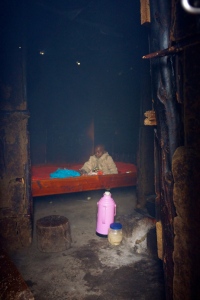Life without light – Napenda Solar Community
This blog entry was written by Sam Cary who is on the Adventures Cross Country Africa Gap year program.
Before we arrived at the locals’ houses we were told how poor their living conditions were, but nothing could have prepared us for the reality of their situations. On the first property we worked on were two toolshed-sized structures: one house and a kitchen. Living in these extremely small and poorly lit structures is a family of 9, named Nancy, Jane, Naomi, Gif, Faith, Abby, Tabi, Leah, and Rose, four of whom are small children.
Before the solar panels were installed, any and all housework, schoolwork, and cooking had to stop after sunset (in Kenya, that is around 6 PM). Without the solar powered electricity, the kids can’t even complete any school work because during the daytime hours, they have to help around the house, tend to animals, and get water from local wells for the families – these chores always take priority over school work. The first family we helped used Kerosene lamps, which are not only a very weak source of light, but are also extremely toxic and are a major cause of many lung issues within families who live in homes without electricity.
The kitchen is so poorly ventilated that the kerosene lamps make the inside look as though someone sprayed a thick layer of black spray paint over all the walls, cooking materials, and the beds. Yes, there are beds in the kitchen where the younger children sleep, every night. When I walked into this kitchen, my eyes immediately began burning and I couldn’t even take a full breath. These young kids spend hours upon hours in this kitchen, making food, sleeping, or simply spending time with their siblings. Many of these kids had coughs that were so severe it made the hazard of their living conditions on their health extremely clear. Unfortunately, the extremely low income these families make prevents the parents from getting any sort of medication for these children.
Providing clean solar powered electricity in their homes will remove the need for the kerosene lamps, which would in turn seriously reduce the lung issues that the people in this family have. Having light in the house and in the kitchen would also allow the kids to do their schoolwork during night hours, and would let the adults work on their professions and crafts — a major source of this families income. This experience has given me an unprecedented appreciation for growing up with electricity and the benefits it has on ones life, as well as opening my eyes to how clean and sustainable solar energy really is. Solar energy truly is the most practical method of creating electricity, with virtually no cost and absolutely no negative repercussions; solar is absolutely the way to power any house, anywhere.
Follow Napenda Solar Community on facebook, twitter , linkedin, and google+ or peruse Africa Expedition Support website for more information.





